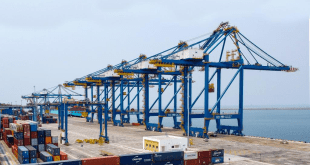Forbes | UNICEF is poised to play a key role in preparations for the malaria vaccine rollout in Africa, where the preventable mosquito-borne disease kills a child under age 5 every minute. “We are entering a new era in immunization and malaria control,” UNICEF Executive Director Catherine Russell said, “hopefully saving the lives of hundreds of thousands of children every year.”
Burkina Faso, Niger, Sierra Leone, Liberia also to receive doses of revolutionary new vaccine in coming months
As the clock ticked toward midnight on the night of Nov. 21 in Yaoundé, Cameroon, aid workers began unloading 331,200 doses of a new, lifesaving malaria vaccine — the world’s first — marking a major milestone in the battle against the deadly disease, which claims the life of one child under age 5 every minute.
It was just the beginning. In the months ahead, an additional 1.7 million does are slated to arrive in other African nations where the disease is endemic. Among them: Burkina Faso, Niger, Sierra Leone and Liberia.
“This could be a real game changer in our fight against malaria. Introducing vaccines is like adding a star player to the pitch.”
In 2021, Africa accounted for 95 percent of the 247 million global malaria cases, and 96 percent of the 619,000 malaria-related deaths. Of those deaths, 77 percent were in children under age 5.
The revolutionary new vaccine, known as RTS,S, or Mosquirix, was approved by the World Health Organization in the fall of 2021 — two years after the launch of pilot rollouts in Ghana, Kenya and Malawi that resulted in the vaccination of about 2 million children. Those vaccinations resulted in a 13 percent drop in all-cause mortality among children eligible to receive the vaccine, and substantially reduced hospitalizations.
The arrival of doses in Cameroon — the first to a country not previously involved in the pilot program — signals that scale-up of malaria vaccinations across highest-risk areas on the African continent will begin shortly.
UNICEF is the largest single vaccine buyer in the world, procuring more than 2 billion doses of vaccines annually for routine immunization and outbreak response on behalf of nearly 100 countries. It is poised to play a key role in preparations for the malaria vaccine rollout, supporting the training of healthcare workers, investing in the infrastructure needed for vaccine storage and delivery and providing technical expertise.
A scientific breakthrough after decades of research
“This could be a real game changer in our fight against malaria,” said UNICEF Executive Director Catherine Russell. “Introducing vaccines is like adding a star player to the pitch. With this long-anticipated step, spearheaded by African leaders, we are entering a new era in immunization and malaria control, hopefully saving the lives of hundreds of thousands of children every year.”
The vaccine is the product of decades of research and constitutes a groundbreaking scientific achievement.
By some estimates, more than 2 billion people are currently infected with the Plasmodium parasite, which is spread to people through the bites of female Anopheles mosquitoes infected with it. Parasites, tiny multi-celled animals, pose unique public health challenges because they have genomes that are 500 to 1,000 times larger than those of most viruses and single-celled pathogens. This allows them to mutate when challenged by the human immune system and to shape-shift into new forms that allow them to evade detection.
In Africa, the deadliest form of the parasite p. falciparum is endemic. And the current supply of the new vaccine far outstrips demand. But that may soon change. Alongside partners including Gavi and WHO, UNICEF has been working to create a healthy and sustainable malaria vaccine market by incentivizing suppliers to develop and manufacture vaccines; managing tenders for supply and access to vaccines; establishing demand forecasts that are informed by countries; and delivering doses to reach the most vulnerable children.
In October, WHO recommended a second vaccine called R21/Matrix-M for use in children between 5 and 36 months old, who are among the most vulnerable to the disease.
The malaria vaccine as potent new weapon — but not a silver bullet
Though the malaria vaccines are a potent new weapon in the malaria fight, they are not a silver bullet. Other public health measures and prevention tools remain essential. UNICEF continues to work with partners to help strengthen and expand the availability of long-lasting insecticidal bed nets, the use of indoor residual spraying and intermittent preventative treatment of pregnant women.
 CameroonOnline.org Cameroon news, Actualité Camerounaise, live Web TV & Radio, World News and a lot more
CameroonOnline.org Cameroon news, Actualité Camerounaise, live Web TV & Radio, World News and a lot more




Don’t take it.